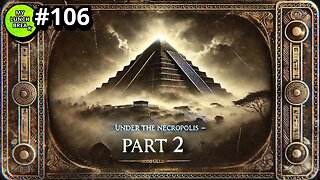Premium Only Content

Frankenstein by Mary Shelley | Summary and Critique
Buy Here: https://amzn.to/4gX4v9z
"Frankenstein" is a novel by Mary Shelley, first published in 1818. The story follows Victor Frankenstein, a young scientist who becomes obsessed with creating life and ends up bringing a creature to life through his experiments. However, he is horrified by the creature's appearance and abandons it, leading to a series of tragic events.
The novel explores themes of scientific ambition, responsibility, and the consequences of playing God. The creature, who is initially innocent and eager to learn about the world, becomes increasingly isolated and bitter as a result of his mistreatment by society.
""Frankenstein"" has been praised for its complex characters, its exploration of ethical and moral questions, and its vivid and evocative prose. However, some have criticized the novel for its melodramatic and gothic elements, as well as its sometimes heavy-handed themes.
Additionally, some have argued that the novel is a commentary on the dangers of the Industrial Revolution and the dehumanizing effects of modernity. Others have interpreted it as a feminist work, highlighting the ways in which female creativity and agency are suppressed in patriarchal societies.
Despite its mixed critical reception, ""Frankenstein"" remains a seminal work of science fiction and Gothic literature, and its influence can be seen in a wide variety of genres and media, from horror movies to philosophical treatises. The novel's enduring popularity is a testament to its ability to resonate with readers.
-
 1:52:24
1:52:24
Squaring The Circle, A Randall Carlson Podcast
1 day ago#032 Flournoy Holmes' Artwork Helped Define The Southern Rock Phenomenon of The Early 1970's
24K3 -
 19:56
19:56
inspirePlay
1 day ago $0.34 earnedWalking with Lions & Facing Africa’s Wild Side | Safari Adventure with the Grid Championship Crew!
14.7K1 -
 10:50
10:50
RTT: Guns & Gear
1 day ago $1.05 earnedBudget Friendly Carry 2011: EAA Girsan Brat 2311
15.3K3 -
 3:49:06
3:49:06
Alex Zedra
17 hours agoLIVE! New Game | Nuclear Nightmare
106K14 -
 25:08
25:08
MYLUNCHBREAK CHANNEL PAGE
1 day agoUnder The Necropolis - Pt 2
288K80 -
 1:45:59
1:45:59
Spittin' Chiclets
1 day agoCanadian Chokejob - Game Notes Live From Chicago - 12.28.2024
265K32 -
 9:18
9:18
Space Ice
1 day agoThe Guyver - Alien Bug Suits, Exploding Dragons, & Mark Hamill - Weirdest Movie Ever
169K27 -
 9:31
9:31
Silver Dragons
1 day agoSilver Has Failed - Can it Set the Record Next Year? THIS BANK SAYS YES!
6.3K2 -
 7:08
7:08
GBGunsRumble
20 hours agoGBGuns Range Report 28DEC24
3.63K1 -
 1:19
1:19
LimitlessAmbition
7 hours ago $0.13 earnedHow the Discipline of Self-Respect Will Change Your Life Forever
2.69K